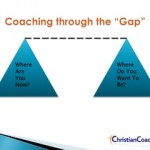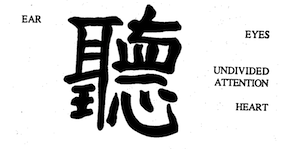
What does it mean when a coach talks about “coaching through the gap?”
Coaching is about moving a client forward, taking action and getting unstuck in a specific area of a client’s life. In secular coaching, it is about moving the client from where they are to “where they want to be”. In Christian Life Coaching, it is about helping clients move from where they are to “where they feel God wants them to be.”
When working with clients, Christian Life Coaches help people to unveil their dreams, clarify their calling, identify their values, strengths, gifts, talents and opportunities God has given to them. Christian Life Coaches help clients to take steps to reach the goals they feel God has put into their lives and strive to be all God wants them to become.
If one burden could be lifted from you in the next 30 days, what would that be?
-
 IAC Coaching Mastery #3 is Engaged Listening and in the ICF Core Competencies, Core Competency #5 is Active Listening so as you can see, the IAC and ICF core coaching skill in this area are in alignment. I will refer to this skill as Engaged Listening since CCI (Christian Coach Institute) is a licensed Coaching Mastery School of IAC.
IAC Coaching Mastery #3 is Engaged Listening and in the ICF Core Competencies, Core Competency #5 is Active Listening so as you can see, the IAC and ICF core coaching skill in this area are in alignment. I will refer to this skill as Engaged Listening since CCI (Christian Coach Institute) is a licensed Coaching Mastery School of IAC.When I think of an “engaged listener”, I get a picture of an intimate kind of listening where two people are deeply connected at the heart level. In one of our coach training classes last week, I asked the coaches-in-training to give me a word that would describe “engaged”, and I heard the words committed, bonded, connected and interwoven …mmm great words to describe communication on a deeper than normal level. Aren’t these great words to describe an engaged listener? Don’t you yearn to be listened to by someone who is “engaged”?
Over the years, as I have studied and researched to sharpen my own skills and to learn more so I can share more with our coaches-in-training, I have really grown to appreciate listening as more of an art. I learned that in Chinese, “to listen” is expressed using the characters that include not only the ears but also eyes, undivided attention and the heart. As we listen to a client and use our eyes, ears, and heart, we have the potential to understand the feeling, meaning and content of the messages we receive from that client. Doesn’t that sound more like an art than simply a skill to be acquired?
Kimberly Dinsdale, a Master Coach and Coach Trainer for Christian Coach Institute, describes 3 ways of listening in her article, “Listening in the Third Way“. Her 3 ways of listening are 1)Agree with listening 2)Disagree with listening, and 3) “Be With Listening”. Kimberly explains “Be With Listening” means exactly what it sounds like. Be. Here. Now. In the Moment. Be here physically, emotionally,mentally. Truly be with the person you are listening to. How would you like to be listened to in such an intimate way that you feel the person “really gets you”?
IAC Coaching Mastery #3 is Engaged Listening and is defined as “gives full attention to the words, nuances, and the unspoken meaning of the client’s communication; the coach is more deeply aware of the client, his/her concerns and the source of the issue, by listening beyond what the client is able to articulate. And as a coach, when we are an engaged listener, the effect on our clients is : 1)The client feels understood and validated – not judged and 2) The client communicates more effortlessly and resourcefully.
On a scale of 1 – 7, how would you rate your listening skills as an Engaged, Active “Be With Listener”? What one action can you take to improve your listening today?
‘I know that you think you understand what you heard me say, but I’m not sure you realize that what I said was not what I meant.” – unknown
-
 “Visioneering is the course one follows to make dreams a reality”, writes Andy Stanley in his book, Visioneering. The formula he shares is “visioneering = inspiration + conviction + action + determination + completion. We all end up somewhere in this life and some will end up at a place on purpose. “
“Visioneering is the course one follows to make dreams a reality”, writes Andy Stanley in his book, Visioneering. The formula he shares is “visioneering = inspiration + conviction + action + determination + completion. We all end up somewhere in this life and some will end up at a place on purpose. “I don’t know about you, but I choose to be among those who end up at a place on purpose. When God plants a vision in our hearts, and we discern and obey, we find ourselves on a journey of great anticipation, not an easy journey, yet one of great hope and excitement. Our God is the CREATOR of the universe and what a privilege, an honor that He chooses to do His work through us. Surpora, a seventy year-old, energized, retired VP of Nursing and Certified Christian Life Coach through our program, said that she knew God was calling her to step out and do more! She wasn’t ready to retire and she hopes that she will be here long enough to “use all her talents and abilities” and leave them here on earth before she goes to her heavenly home. What an inspiration and blessing she has been to me, and to others at CCI.
How Do Christian Life Coaches Help Clients in Visioneering?
As Christian life coaches work with clients in visioneering, we know that we must first help our clients create a clear picture of what could be and then to help them align their vision with their core values and continue to hold that vision for them. In Visioneering, Andy Stanley writes, “encourage them to look beyond what is, and paint a picture of what could be – and in some cases – what should be. That is creating a vision.” He continues to share the following instruction on “how” to bring the vision into focus and weave it into our daily lives:
1. PASSION: Vision evokes emotion. There is no such things as emotionless vision. Vision is always accompanied by strong emotion. And the clearer the vision, the stronger the emotion.
2, MOTIVATION: Vision provides motivation. The mundane begins to matter. The details, chores, and routines of life begin a worthwhile means to a planned-for end. Vision-driven people are motivated people.
3. DIRECTION: Vision serves as a road map. Vision simplifies decision-making. Anything that moves us toward the the realization of our vision gets a green light. Everything else is approached with caution.
4. PURPOSE: Vision translates into purpose. A visions gives you reason to get up in the morning. If you don’t show up, something important won’t be accomplished. Suddenly, you matter – alot! You have a reason for getting up, and showing up!
God calls us to do His Work and He has a plan for each person in the universe.
I love what John Maxwell writes in his book, Cure for the Common Life, “You are heaven’s Halley’s comet; we have one shot at seeing you shine. You offer a gift to society that no one else brings. If you don’t bring it, it won’t be brought.” “As Christian life coaches, we seek to honor the calling God has on each individual and we encourage them to honor that which God is calling them to do. God has a vision for each life , and He needs each of us to do our part and to be obedient to what He wants to do in and through us.
God made each of us and then He broke the mold. There is only one me and He knows me, loves me and has a plan just for me. How special is that to know? “The Lord looks from heaven; He sees all the sons of men. From the place of His dwelling, He looks on all the inhabitants of the earth; He fashions their hearts individually: He considers all their works”. Psalms 33:13-15
What is the vision God is calling you to? What can He do in and through you for His Glory in this broken and pain filled world? What does it look like? What does it feel like? And, what is your answer to His calling, His vision for your life?
-
 DISC Personality and Relationships
DISC Personality and Relationships DISC personality profiles can be very effective tools in helping to build stronger relationships. In fact, the DISC personality profile is used by many counselors and coaches in helping couples improve their relationships by understanding how they handle conflict, recognize each others’ “hot buttons” and help us understand each others’ “sensitive spots.”
DISC Personality and Conflict
DISC personality “D” type (Do-er, Dominant, Decisive) can be hard headed and difficult and will be fine as long as things are done their way. A “D” personality deals with conflict head on, and has no problem with conflict, standing up against anyone who seems to resist them or their strong beliefs. The “D” personality seeks to “Get it right” and to get results, is task-oriented more than people oriented, and their biggest fear is not getting it done.. failure. In a relationship, the “D” personality needs to be insensitive to people’s feelings and to focus on task.
DISC personality “I” type (Inspiring and Influencing) can talk their way out of almost anything as these personalities are great at influencing or inspiring others with their charm and charisma. “I” personalities seek to “Get recognized and appreciated” for their ideas, and want to share ideas and to be heard. The “I” personality is people-oriented more than task-oriented and needs to pay more attention to details and also need to focus on the task at hand. This person can be “all over the page” and may have a hard time getting focused to complete a task.
DISC personality “S” types (Steadiness, Security minded) need to understand “why” change has to occur before being thrust into change. This person is loyal, and likes to plan events as opposed to the “D” and the “I” who are more spontaneous. The “S” personality seeks “Get Harmony and Peace”, and tends to be more agreeable. Although the “S” personality may give in to pressures from “I” and “D” personality, be careful because this personality will “stew” ab0ut giving in and circle back to talk about it again.
DISC personality “C” (Compliant, Cautious, Careful) is seldom wrong because they research, and at times can over-analyze which may be perceived as being critical. The “C” personality seeks to “Get it right” and they ask alot of questions. This personality is task-oriented and although reserved in their demeanor, they can be relentless when it comes to research and getting all the facts before making a decision.
Isn’t it interesting that the very differences that attracted us to someone can become the very traits we end up resenting, and become the “hot buttons” in a relationship? When we seek first to understand our own behavior, and how we react in stressful situations and how we respond to conflict, then we can begin to appreciate the differences in others, and adapt our behavior to create more open and respectful communication.
What can you do to work through the rough spots in a relationship when each of the 4 profiles have different “motivators”? “Get it done” or “Get recognized”, “Get harmony” or finally “Get it Right”?